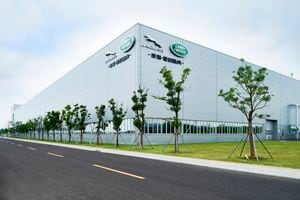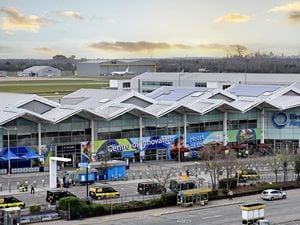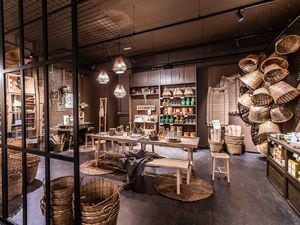Jaguar Land Rover opens new engine factory – in China
Jaguar Land Rover today opened a new engine factory in China that will be making the Ingenium engines previously manufactured only at Wolverhampton.

But the plant on the i54 site will still be making engines for the newly unveiled Jaguar E-Pace 'baby' SUV and all other JLR models. Although the new factory will be making the E-Pace and its engines for the Chinese market from 2018, JLR says engines for the rest of the world will still be made in Wolverhampton.
Initially the car is being made by contract manufacturer Magna Steyr in Austria, with the first cars rolling off the production line later this year with their Wolverhampton-built power plants.
Jaguar Land Rover's first overseas engine factory is part of a £1.2 billion joint venture with China's Chery Automobile company and will make Ingenium 2.0 litre petrol engines for future Chery JLR vehicles made for the company's fast-growing Chinese market.
During the first six months of the year, Jaguar Land Rover sales have increased by 26 per cent in China. JLR says the new engine plant demonstrates its long-term commitment to the Chinese market, "providing customers with an exciting range of vehicles and powertrain options", as well as to its joint venture.
CheryJLR executive director Qing Pan said: "China continues to be an important market for Jaguar Land Rover. Our sales have increased by 26 per cent during the first half of the year, driven by our discerning Chinese customers’ desire for new, exciting vehicles.
"Our new engine plant in Changshu supports our strategy to become a more competitive global business. It will strengthen our international manufacturing capabilities and complement our existing facilities in the UK."
Operations began at Chery Jaguar Land Rover’s plant less than three years ago and since then it has manufactured more than 100,000 vehicles. It produces the Range Rover Evoque, Land Rover Discovery Sport and, exclusively for the Chinese market, the Jaguar XFL.
The company says the start of production of the Ingenium engine in China "supports Jaguar Land Rover’s global vision to reduce emissions and improve fuel efficiency by making improvements in powertrain, continue its leadership in light-weighting and improve vehicle energy conservation – all without compromise for its customers".
JLR says the Chinese plant mirrors its sister plant in Wolverhampton, including both machining and assembly halls to manufacture the most advanced engines Jaguar Land Rover has ever produced. At more than 50,000 sq m – 540,000 sq ft – the new facility contains a fully flexible production line with 28 robots.
Murray Dietsch, president of Chery JLR, said: "Our new engine plant incorporates the latest cutting-edge engine manufacturing technologies from Jaguar Land Rover to deliver the new Ingenium petrol engine to our Chinese customers and today’s opening ceremony is another important milestone for the team in Changshu."
Meanwhile work is continuing on the expansion of the Wolverhampton engine plant, a £1 billion facility which is being doubled to 2 million sq ft. It already employs 1,400 people making both diesel and petrol Ingenium engines for most of Jaguar Land Rover's new models. The expansion is expected to create hundreds of new jobs, although JLR remains tight-lipped about exactly what kind of engines the new factory area will produce.
The company maintains that "the UK is the heart and soul of Jaguar Land Rover’s business and remains at the centre of the company’s design, engineering and manufacturing capabilities". But its car making plants at Solihull, Castle Bromwich and Halewood are close to their operating capacity, which JLR says it why it is opening new car plants in Brazil, Slovakia, India and China. It is also using the Magna factory in Austria to make its first all-electric car, the I-Pace Jaguar.
It also says the move protects it against currency fluctuations. In particular, exporting around 80 per cent of the cars it makes in the UK, it will have taken a hit from the fall in the value of the pound since last year's Brexit vote.





